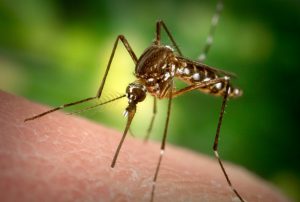How bacteria can limit the spread of Zika virus
Zika virus is spread through the bite of infected Aedus species mosquitoes. While generally not a major concern to healthy adults, infection with Zika virus poses a significant threat to pregnant women and their fetuses. Zika infection while pregnant can lead to serious birth defects such as microcephaly and congenital Zika syndrome. Given the mode of transmission of the virus, Zika infection has the highest risk in warm regions where mosquitos are prevalent – India, Africa, South America, Latin America and portions of the United States. Within the United States, Zika infection from local mosquito-borne transmission has been documented in Texas and Florida. Currently, there is no treatment for Zika infection and the focus for preventing the spread of Zika is through mosquito control, primarily by using insecticides to kill adult mosquitos and larva. While these methods reduce mosquito populations, they have not proven to be effective in preventing transmission of the virus.
A new and innovative strategy to prevent Zika transmission involves using bacteria to infect mosquitos that render the mosquitos incapable of propagating. Previous research has demonstrated that mosquitos infected with the bacteria Wolbachia display a reduction in fertility, but the mechanism is unclear. Dr. Seth R. Bordenstein and colleagues at Vanderbilt University have identified two genes that regulate this process. Their findings were recently published in Nature.
Wolbachia Genes Can Induce Embryonic Arrest
 With the announcement that Brazil and Columbia will be implementing the widespread release of Wolbachia-infected Aedus mosquitos, it is important to understand the process by which Wolbachia limits Aedus fertility. It is known that Wolbachia can induce cytoplasmic incompatibility (CI) resulting in embryonic lethality. Bordenstein and colleagues sought to further understand this pathway and began by analyzing the genome of Wolbachia strains that are known to cause CI against strains that do not cause CI. The list of genes was ultimately narrowed down to just two that the researchers named cifA and cifb. To test the in vivo effect of these genes on CI, both genes were expressed in transgenic Drosophila melanogaster (fruit flies), and hatch rates were measured. Hatch rates were significantly reduced by dual expression of both transgenes, similar to the levels seen in wild-type crosses of infected males and uninfected females. Further analysis demonstrated that embryos from crosses of transgenic flies expressing cifA and cifb resulted in embryonic arrest at the same stage of development as what is observed in wild-type CI.
With the announcement that Brazil and Columbia will be implementing the widespread release of Wolbachia-infected Aedus mosquitos, it is important to understand the process by which Wolbachia limits Aedus fertility. It is known that Wolbachia can induce cytoplasmic incompatibility (CI) resulting in embryonic lethality. Bordenstein and colleagues sought to further understand this pathway and began by analyzing the genome of Wolbachia strains that are known to cause CI against strains that do not cause CI. The list of genes was ultimately narrowed down to just two that the researchers named cifA and cifb. To test the in vivo effect of these genes on CI, both genes were expressed in transgenic Drosophila melanogaster (fruit flies), and hatch rates were measured. Hatch rates were significantly reduced by dual expression of both transgenes, similar to the levels seen in wild-type crosses of infected males and uninfected females. Further analysis demonstrated that embryos from crosses of transgenic flies expressing cifA and cifb resulted in embryonic arrest at the same stage of development as what is observed in wild-type CI.
The discovery of these genes and their importance in regulating CI and subsequent embryonic arrest provides additional support for the use of Wolbachia vector infection as a potential control strategy for mosquito-borne diseases. Further research and understanding of cifA and cifb may also be used to improve the current Wolbachia control strategy or provide the basis for an alternative strategy focusing on the two genes themselves.
Related Products:
- Zika Virus Envelope (E) Protein Antibody, specific for the ED3 domain of Zika E protein
- Flavivirus Envelope (E) Protein Antibody, which recognizes the domain II of flavivirus E protein
- dsRNA Antibody, which recognizes viral double-stranded RNA and has been used to detect Zika virus infection
- Delta-G-VSV Pseudotyping System, which enables analyses of infectious viral entry at just biosafety level 2 (BSL-2)
Related Research:
- How an antibody inhibits Zika virus infection
- Antibody protects pregnant mice & their fetuses from Zika virus infection
- How killer T cells control Zika infection
- Zika therapeutic targets identified using CRISPR technology


